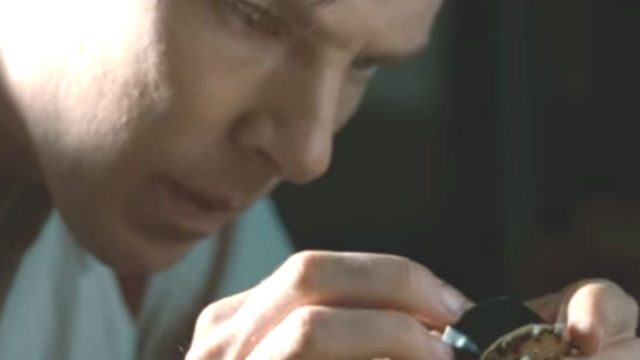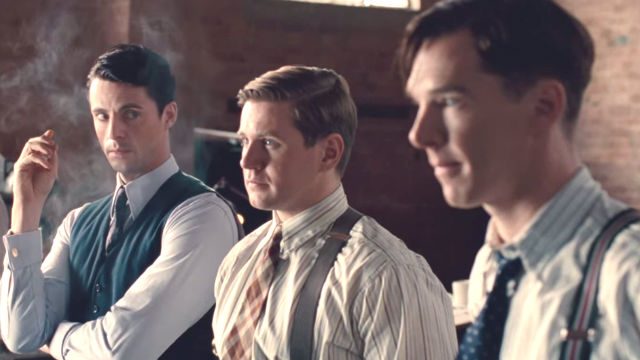SUMMARY
This is AI generated summarization, which may have errors. For context, always refer to the full article.

MANILA, Philippines – Morten Tyldum’s The Imitation Game opens with Alan Turing (Benedict Cumberbatch), now famous for being the grandfather of modern computers with the prototype he invented for the purpose of breaking Nazi codes during World War II, being interrogated by a detective.
Before narrating a portion of his life, he cautions the detective, and perhaps also the film’s audience, to listen carefully, and not to judge him.
Turing, from the first time we see him, however, is easy to judge. He mumbles his condescending statements in a manner that is close to obnoxious. His gestures are odd and suspicious. In other words, Turing is the type of man that one automatically boxes into a category.

The Imitation Game, like the man it celebrates, is also easy to judge at first glance. It is as conventional as any other conventional biopics detailing the successes of unlikely heroes. Beneath the veneer of humdrum pertinence its genre needlessly requires is something very peculiar and intriguing.
A rallying point
Certainly, the film will win emotions with its extremely tasteful tale of Turing’s very important contributions that have been muddled by his indictment for an antiquated crime connected to his homosexuality.
With its unmasked relevance in this day and age of political correctness, the film can be seen as a rallying point for the abolition of outmoded perspectives that in the past have done more harm than good to humanity.
Tyldum commits to this. The Imitation Game, with quotable lines like “Sometimes it is in the people who no one imagines anything of who do the things that no one can imagine,” has that distinct feel of a Hallmark movie, although crafted in a way that makes its inspirational motivations more palatable to cynics.

The film simultaneously treads 3 narratives within Turing’s short lifetime. The meat of The Imitation Game is of course Turing’s work in Bletchley Park, where he and his comrades spent months developing their code-breaking machine. Turing’s post-World War II life is depicted through a police investigation around him and a robbery that happened in his place where curiously, nothing was taken.
A love story, above all
Finally, Turing is seen as a prepubescent lad (Alex Lawther) who is bullied by his boarding school peers because of his obvious eccentricities. He develops a delicate and somewhat romantic relationship with Christopher, his sole protector in school and for whom he would name his code-breaking machine.
Except during the moments wherein young Turing is seen lovingly glancing at Christopher or blushing while decrypting coded notes, Turing is seen and portrayed by Cumberbatch as this almost unlovable fellow, absorbed in his obsession to build his beloved machine. In fact, Tyldum seems bent on showcasing Turing as morosely sexless, even with his homosexuality at the fore.
The film only becomes charged with a certain energy that is akin to being suggestively sensual is when Turing is shown working on his machine, and defending it with his life and dignity.
The Imitation Game feels like a primitive precursor to Spike Jonze’s Her (2013), with its preoccupation in detailing a man’s passionate relationship with a machine, complete with all its connected feelings like paranoia, jealousy and devotion.

Unmistakable humanity
This is the film’s splendid core. It portrays Turing as someone who resembles the heartless machines he so obsessively crafts, only to have him evolve into a tragic figure whose impulse for greatness is love.
Tyldum expertly counterpoints the three narratives to a finale that despite its very saccharine methods is truly moving. The ability to love, whether it be for a person of the opposite or the same gender, or for a machine, is what separates humans from the rest of the world.
In the end, Tyldum’s version of Turing is not a historical figure belatedly begging for the renown that was unduly snatched from him by that generation’s intolerance. His Turing is one wanting to be judged for his unmistakable humanity, despite all his quirks and frailties. – Rappler.com
 Francis Joseph Cruz litigates for a living and writes about cinema for fun. The first Filipino movie he saw in the theaters was Carlo J. Caparas’ ‘Tirad Pass.’ Since then, he’s been on a mission to find better memories with Philippine cinema. Profile photo by Fatcat Studios
Francis Joseph Cruz litigates for a living and writes about cinema for fun. The first Filipino movie he saw in the theaters was Carlo J. Caparas’ ‘Tirad Pass.’ Since then, he’s been on a mission to find better memories with Philippine cinema. Profile photo by Fatcat Studios
Add a comment
How does this make you feel?
There are no comments yet. Add your comment to start the conversation.